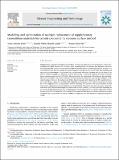| dc.description.abstract | Bentonite is a natural pozzolanic material mostly composed of SiO2 and employed in cementing
materials for the reduction of cement consumption and CO2 emission besides improving perfor-
mance of cement composite material by consuming portlandite to form extra C-S-H gel. So, many
researchers studied on partial replacement of bentonite to improve concrete performance.
However, bentonite mostly exists as a consolidated form that needs treatment for activation of
pozzolanic reactivity to improve performance of cement composite materials. However, it is not
well known how different replacement of raw and calcined bentonite affects performance of
cementing materials in different hazardous environment. Hence, the present study identified the
most influential replacement of bentonite, evaluating different calcined and raw bentonite in
environments of acids, salt, and elevated temperature in addition to assessing the mechanical and
physical properties of cement composite material. So, the results indicate that the employment of
raw and calcined bentonite reduces the fresh bulk density, improves compressive strength, and
Vicker hardness at 28 days, reduces the mass loss due to 56 days immersion in 5% HCl, 10% NaCl,
and 5% HNO3 compared to the control mixture. Moreover, the employment of calcined bentonite
at 800 ◦C significantly improved the durability and mechanical properties of cement composite
materials compared to the control mixture. Specifically, replacing bentonite calcined at 800 ◦C for
3hs by 20% has the highest compressive strength than all samples after 28 and 56 days. Besides
these, the study reveals that the corrosion potential of steel bars embedded in the mortar is
reduced as the proportion of raw and different calcined bentonite increases. Generally, the
employment of calcined bentonite is very beneficial to get improved performance on mechanical
and durability properties of cement composite materials. | en_US |

